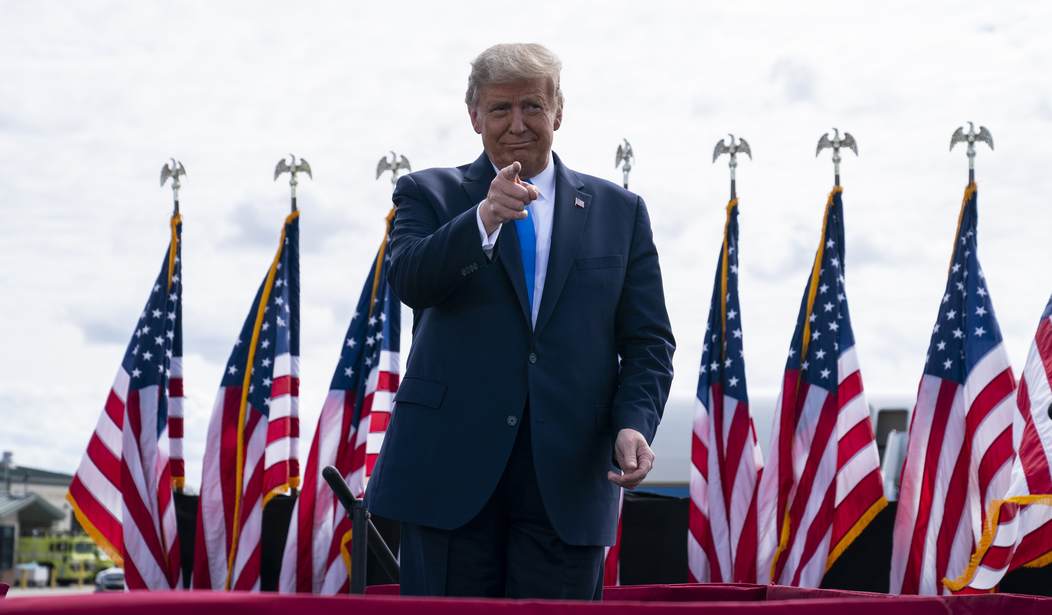The polls say what they say.
The media culture is what it is.
American liberalism will be what it will be, and it can be expected that as returns roll in Tuesday night, it will be in full-blown indignation as it attempts to limit President Trump to one term.
But if the nation is still the place I believe I still recognize, that effort will be no more successful than the failed and forgotten impeachment.
The America I recognize has not always been the America I wanted. I wanted an America that would limit Bill Clinton to one term and keep Barack Obama from the presidency altogether. But I did not expect those results. I do expect the Trump re-election, for reasons that have nothing to do with poll results or other scientific samplings.
Those high-minded pursuits fell on their collective faces in 2016. That does not automatically mean similar embarrassment awaits them in 2020, but the ingredients are in the pan. Polling has famously overweighted Democrats in this cycle, and this time the pollsters might be somewhat less at fault. Their attempts to divine the intents of Republican America may be heavily dampened by Republican America’s distaste for pollsters.
Are there enough reticent Trump supporters to swell a “silent majority” of voters who rise up to speak on the only occasion where it matters—through the ballot? We’re about to find out.
But whether Trump voters practice strategic stealth or walk around with bullhorns, one thing seems obvious: there are at least as many of them as there were in 2016. 2020 is the year of pernicious mythology—the myth of voter suppression, the myth of reliable voting by mail, and the myth of Trump bleeding support, most notably in America’s suburbs and most decidedly among women.
Recommended
My conclusions involve no deep data dive, but here is simple math: Whatever appeal Trump had in 2016 among women or men, among city dwellers, suburbanites or rural folk, it was enough to win by nearly 80 electoral votes. Now do your own survey: try to find someone who voted for him in 2016 but will not this year. Good luck. It is like searching for Sasquatch or an Evan McMullin voter.
What would make a supporter hit the exits? The tweets? The brashness? The constant self-promotion? Those were all on display throughout the entire 2016 campaign. If anything is different in 2020, it is the four years of an agenda that has made the case to many who may have been previously hesitant.
Some conservatives wondered how devoted Trump was to constitutionalist Supreme Court justices, to the pro-life cause, to Israel and to regulatory reform. No one wonders now. While the Trump voter with buyer’s remorse is a near-impossibility to find, there is no shortage of voices testifying about sitting out 2016 but primed to offer full-throated support today.
So attention turns to the other side of the equation. What is the fuel behind the support for Joe Biden? At face value, its potency is dubious. Biden triangulated his way through a crowded Democrat field containing many names that garnered deeper passions. But those passions were not broad enough to mount a challenge, resulting in a nominee admired by many but exciting to few.
If that were the only factor, we’d be looking at a 40-state blowout. As it happens, Biden will be buoyed by an organic force of nature: Trump hatred.
I’ve spent many hours on the radio talking to Democrats. Benefits of a Biden presidency do not spring easily to their lips, other than its capacity to end the current one. This is not a minor thing. Hillary Clinton’s 2016 loss surely featured independent voters who may not have had great attraction for Trump but had developed sufficient distaste for her.
But this is different. Biden is relying on wind in his sails blown from the white-hot fury of voters who cannot stand one more day of Trump. This is not a small number of people, for one reason: this is one of the most consequential presidencies in modern history. Note that the term connotes neither like nor dislike, merely impact. Trump is one of our most loved and most hated presidents ever because the change is real.
This is not an era of ambivalence. Americans have often felt that their lives do not change much based on presidential elections. Few felt that way four years ago, even fewer do now.
So, one more simple math problem. Which is larger? The number of voters eager to see a second Trump term or those driven to prevent it?
Just as some voters will be powered by a desire to fend off that second Trump inauguration, others will strike a blow against the prospects of a Biden win for a variety of reasons.
I don’t believe the country I know will reward his party’s insufficient distaste for anarchy and violence in our cities.
I don’t believe it will invite the COVID lockdown fetishes of the authoritarian left.
I don’t think many voters will welcome the planned extinction of our fossil fuels industries, or seek to change horses in the middle of a stream brimming with economic hope.
I don’t believe the electorate lacks appreciation for a Middle East so quiet that peace deals now arise with familiar regularity.
And I don’t for one minute believe that a deciding number of voters will follow the siren song of a media culture that has sacrificed any remaining shreds of its credibility on a four-year altar of vindictive dishonesty.
This is not a guarantee of a Trump win. It is a statement about the nation I still think I recognize. Now we find out if that America still exists.

























Join the conversation as a VIP Member